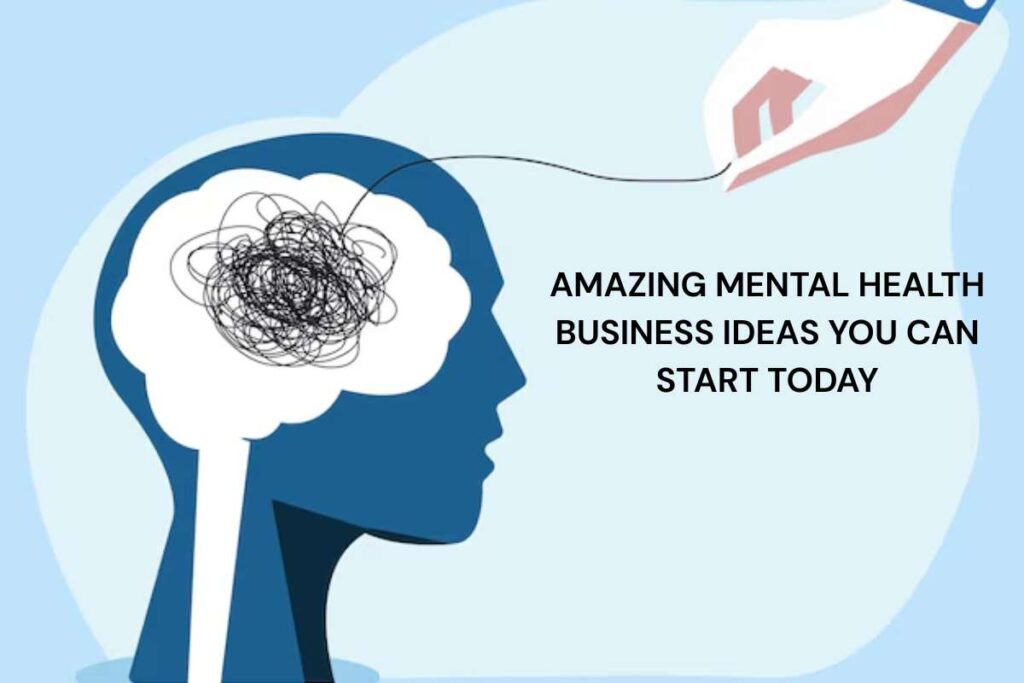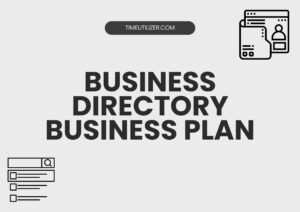
In the growing field of mental health businesses, many new and creative ideas are changing how we think about and handle mental well-being. Business owners are using technology more and more to make mental health services easier to access. There are now apps for therapy sessions on demand, meditation guides, and mood tracking tools everywhere. At the same time, traditional services like counselling and psychiatry are adapting to today’s needs by including holistic methods and personalised care.
Table of Contents
Besides digital solutions, there is a rise in wellness-focused businesses, like small therapy centers, mindfulness retreats, and companies creating therapeutic products such as sensory aids and relaxation gadgets. These businesses serve people looking to actively maintain their mental health and also target companies that view employee well-being as an important investment.
As society becomes more aware of mental health issues, the entrepreneurial drive grows, leading to more innovation and investment. The future looks bright, with more opportunities for businesses to make money and have a positive social impact by promoting resilience and emotional well-being worldwide.
Why is a Mental Health Startup a Good Idea?
The COVID-19 pandemic has significantly impacted mental health worldwide. The sudden changes in daily life, isolation, and the uncertainty caused by the pandemic have led to increased levels of anxiety, depression, and stress.
Many people have experienced feelings of loneliness and helplessness due to lockdowns and social distancing measures. Additionally, the economic impact and loss of loved ones have further exacerbated mental health issues. The pandemic has highlighted the importance of accessible mental health services, revealing gaps in the current system and the need for more resources and support.
Starting a mental health business now can be incredibly rewarding. The growing awareness of mental health issues creates a strong demand for innovative solutions and services.
As more people seek help and support, there’s a significant opportunity to make a positive impact on individuals and communities. Whether it’s through developing apps, offering therapy, or creating wellness products, your business can play a crucial role in promoting mental well-being. Addressing this vital need can lead to a successful career for yourself as an added bonus.
Common Mental Health Challenges Faced by an Average American
According to recent data from the National Institute of Mental Health (NIMH) and other reliable sources, the percentages of average American adults facing different kinds of mental health challenges are as follows:
1. Anxiety Disorders: Approximately 19.1% of adults have an anxiety disorder.
2. Major Depressive Disorder: Around 7.1% of adults experience a major depressive episode each year.
3. Bipolar Disorder: About 2.8% of adults are affected by bipolar disorder.
4. Post-Traumatic Stress Disorder (PTSD): Around 3.6% of adults have PTSD.
5. Obsessive-Compulsive Disorder (OCD): About 1.2% of adults live with OCD.
6. Schizophrenia: Roughly 0.25% to 0.64% of adults are diagnosed with schizophrenia.
7. Substance Use Disorders: Approximately 7.7% of adults have a substance use disorder.
Percentages of American teens (ages 13-18) facing different kinds of mental health challenges are as follows:
- Anxiety Disorders: About 31.9% of teens have an anxiety disorder.
- Major Depressive Disorder: Approximately 13.3% of teens experience a major depressive episode each year.
- Bipolar Disorder: Around 2.9% of teens are affected by bipolar disorder.
- Post-Traumatic Stress Disorder (PTSD): About 5.0% of teens have PTSD.
- Obsessive-Compulsive Disorder (OCD): Approximately 1.0% to 2.0% of teens live with OCD.
- Schizophrenia: The prevalence is lower in teens compared to adults but is estimated to be around 0.23%.
- Substance Use Disorders: About 5.1% of teens have a substance use disorder.
These percentages indicate a significant portion of the population dealing with mental health issues, emphasising the need for accessible mental health services and support systems.
Mental Health Business Ideas
As an entrepreneur, there are many different approaches you can take to start up a mental health business. You can opt for a physical platform, or a simple online app can also be a solution to that.
Here’s a few examples of what your mental health business could look like;
· Physical Platforms

1. Meditation studio
Starting a meditation studio can be a great entryway to a mental health business. A studio that is quiet and devoid of outside business can be just what many people need. At the studio, you can offer a variety of classes and meditation sessions. The classes can be about guided meditation, yoga, painting, sewing/embroidery or some other self-wellness practices.
Not only that, you can even offer different wellness products like scented candles, incense, and agar wood chips at your studio. That way, you can make passive income as well.
2. Yoga /mental health retreat
This is very similar to the prior one. Whereas a meditation studio focuses on the mental well-being of individuals, a yoga studio helps with physical health. Yoga helps people struggling with mental health issues by enabling them with enhanced mindfulness, better sleep, and improved moods.
A yoga studio can generate revenue from different sources like classes, sessions, merch, memberships, etc. It also helps that the demand for yoga studios is ever-growing.
3. Natural healthcare/ mental wellness product line
Launching a product line that directly impacts individuals struggling with mental health issues is a great business strategy. People naturally gravitate towards natural health products. So, if you can get your name out there as a quality brand, there is very little room for error. And taking a holistic approach to mental wellbeing is sure to catch people’s eyes. With the help of social media, this could be your breakthrough as a businessperson.
4. Opening a gym
Good physical health is the answer to most mental health issues. Opening up a gym can greatly help a whole community. Working out gives people a clear state of mind and creates mindfulness.
As a business idea, there’s not really much to consider. If there’s a somewhat big population of young to middle-aged people, a gym is a sure success, as today’s lifestyle doesn’t really leave much room for physical activity.
· Online platforms
If your goal is to reach more people with your platform, then building an online one is the best course of action. That way, you don’t have to break the bank and can offer good quality service at the same time. Online services are better because they are accessible and convenient to most people. Also, in most online services, there’s a sense of anonymity that is an attractive feature to many people.
Here’s a few ideas you can explore;
1. Mental health assessment apps
Mental health assessment apps are digital tools that help individuals evaluate their mental health and identify potential issues, offering features that make assessments more accessible and convenient. These apps are rather useful when the user needs to keep their emotions in check. These help to check back with themselves regularly.
2. Mental health wearables
Mental health wearables can greatly influence people with unstable moods. Mental health issues aren’t visible physically but body chemistry, heart rate, and BP changes with our moods. Wearing something that alerts users when a negative change occurs can make them more mindful of themselves.
3. Prescription management apps
Prescription management apps support individuals with mental health challenges by ensuring consistent medication use, reducing stress, and improving overall treatment outcomes. These apps provide reminders for medication, track intake, log side effects, simplify refills, offer educational resources, keep medication history, and facilitate communication with healthcare providers. Additionally, they can integrate with other health data to tailor treatment plans. Reminders for timely medication.
You could include features like;
- Tracking medication intake
- Logging and reporting side effects
- Simplifying prescription refills
- Providing educational resources
- Keeping medication history
- Facilitating communication with healthcare providers
- Integrating with other health data
4. Online therapeutics
Online therapeutics, also known as digital therapeutics or e-therapeutics, are evidence-based therapeutic interventions delivered through digital platforms, such as apps, websites, and other digital devices. They are designed to prevent, manage, or treat medical conditions, including mental health disorders, by leveraging technology to provide therapeutic support and resources.
5. Peer support networks
Individuals who suffer from mental health issues often struggle with forming a connection with other people. An app that can connect people who are going through the same struggle and form a community can greatly influence them positively. With proper monetization, you can generate good revenue from it.
6. Analytics app
A mental health analytics app is a digital tool designed to track, analyse, and visualize data related to mental well-being. It collects information from users through self-assessment surveys, mood tracking, and other inputs to provide personalized insights and trends.
These apps help individuals monitor their mental health over time, identify patterns, and make informed decisions about their well-being. By offering data-driven suggestions and resources, they empower users to take proactive steps in managing their mental health and seeking appropriate support when needed.
7. Mindfulness app
Mindfulness apps guide users through practices to reduce stress and improve well-being with guided meditations, breathing exercises, and mindfulness techniques. This has a similar revenue-generating process to the other mental health related apps.
In conclusion, the mental health business sector is experiencing significant growth as awareness and acceptance of mental health issues continue to rise. By leveraging technology, innovative business models, and holistic approaches, you, as an entrepreneur, can make a meaningful impact on individual and community well-being.
As the demand for accessible and effective mental health solutions increases, businesses that prioritize empathy, quality care, and evidence-based practices are well-positioned for success.

I’m Farzana, a writer with over 5 years of experience and a genuine passion for business, home improvement, fashion, and digital marketing. I love creating content that’s engaging and easy to relate to—whether I’m breaking down a marketing strategy, sharing simple home tips, or exploring the latest style trends. Writing allows me to connect with people across different interests, and I’m always excited to bring a fresh, practical perspective to every topic I cover.





